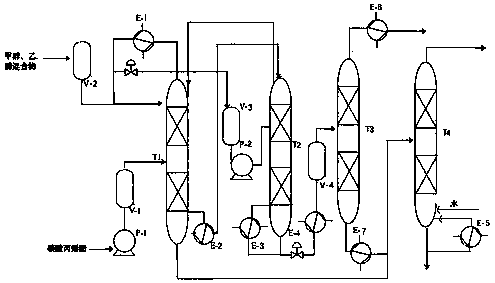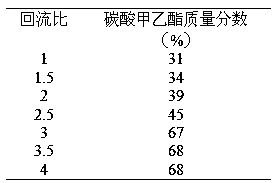One-step technology for synthesis of ethyl methyl carbonate and co-production of 1,2-propanediol
A technology of ethyl methyl carbonate and diethyl carbonate, which is applied in the technical field of synthesizing ethyl methyl carbonate, can solve the problems of increased operating costs, high energy consumption in industrial production processes, low conversion rate of reactants and low product selectivity, and achieves The effect of short synthetic route and clean reaction process
- Summary
- Abstract
- Description
- Claims
- Application Information
AI Technical Summary
Problems solved by technology
Method used
Image
Examples
Embodiment 1
[0048] Propylene carbonate, methanol and ethanol are used as raw materials to react to form ethyl methyl carbonate, the ratio of methanol to ethanol is 3:2, and the excess propylene carbonate is recycled.
[0049] The catalyst is an alkaline composite material 15%BaO-5%ZnO-3%La 2 o 3 / Cs-meso-EMT, the dosage is 3% of the total mass sum of the raw materials, and the ratio of the cross-sectional area of the initial distillation section to the side line section is 1:1.
[0050] The operating conditions are as follows:
[0051] The first reactor T1: tower diameter 1000mm; tower height 19000mm; the number of trays in the public rectification section, initial distillation section, side line section, and public stripping section are 10, 20, 30, 15 respectively; the pressure inside the tower is 5MPa; The top temperature is 70°C; the bottom temperature of the common stripping section is 150°C; the bottom temperature of the side line section is 130°C.
[0052] Pressurized distillat...
Embodiment 2
[0060] Under the operating conditions of embodiment 1, the total raw material mass flow rate is 2500kg / h, and when the rectification pressure is 3MPa, the T2 pressurized rectification column reflux ratio is changed, and the change of the ethyl methyl carbonate mass fraction at the bottom of the tower still is as shown in Table 2 .
[0061] Table 2 Effects of different reflux ratios on the change of the mass fraction of ethyl methyl carbonate at the bottom of the T2 pressurized rectification column
[0062]
[0063] It can be seen from Table 2 that with the increase of reflux ratio, the mass fraction of EMC in the bottom of T2 pressurized distillation column first increases and then the rate of increase slows down obviously. The reason is that with the increase of the reflux ratio, more methanol, ethanol, DMC and the azeotrope of DMC and methanol at the top of the tower are taken away from the liquid phase, and the mass fraction of DMC in the bottom fraction of the tower dec...
Embodiment 3
[0065] Under the operating conditions of Example 1, when the total raw material mass flow rate is 2500kg / h, the pressure of the T2 pressurized rectification tower is changed, and the changes in the mass fractions of the components at the bottom of the tower are shown in Table 3.
[0066] Table 3 The influence of different pressures on the composition of the bottom of the T2 rectification column
[0067]
[0068]It can be seen from Table 3 that the mass fractions of methanol and ethanol in each liquid phase composition decrease as the reaction pressure increases, because the boiling point difference of the azeotrope composition increases at higher pressure, and the azeotrope is easier to separate. However, when the pressure is higher than 3MPa, the components remain basically unchanged. Because high pressure requires high equipment, it will greatly increase the input cost, so 3MPa is the best condition for this rectification process.
PUM
 Login to View More
Login to View More Abstract
Description
Claims
Application Information
 Login to View More
Login to View More - R&D
- Intellectual Property
- Life Sciences
- Materials
- Tech Scout
- Unparalleled Data Quality
- Higher Quality Content
- 60% Fewer Hallucinations
Browse by: Latest US Patents, China's latest patents, Technical Efficacy Thesaurus, Application Domain, Technology Topic, Popular Technical Reports.
© 2025 PatSnap. All rights reserved.Legal|Privacy policy|Modern Slavery Act Transparency Statement|Sitemap|About US| Contact US: help@patsnap.com



